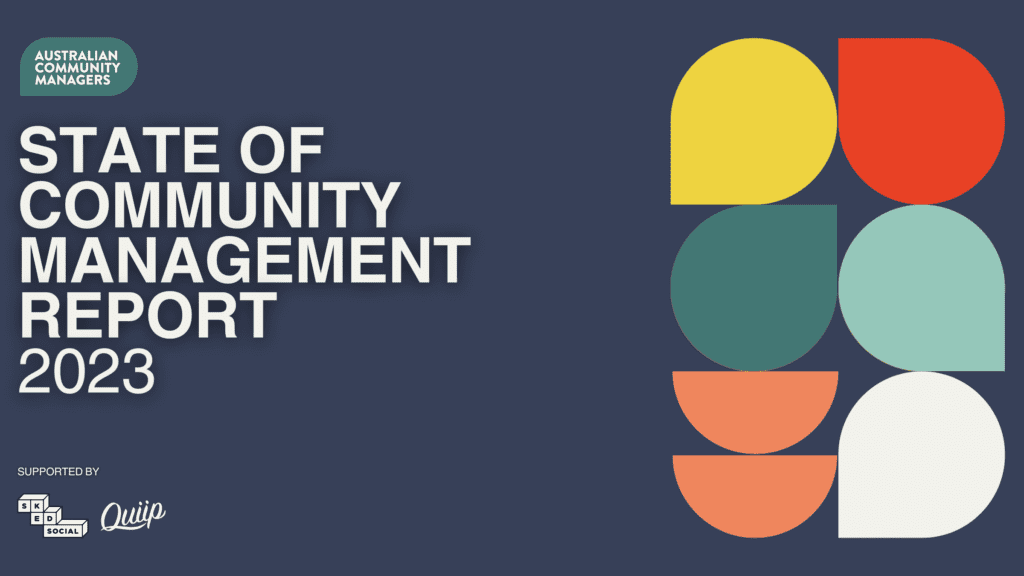2023 ACM State of Community Management Report Round Up

Quiip is thrilled to sponsor the seventh annual ANZ State of Community Management Report. A big thank you to Venessa Paech of Australian Community Managers for conducting this research, and compiling these findings for the benefit of our industry. Let’s jump right into the key takeaways.
81% of community professionals are female
Since the survey’s start in 2015, women have always been the dominant gender in the industry. This year, women registered at an all-time high of 81%, up from 72% in 2022. With men following up with 17%, and non-binary and transgender with a respective 2% and 1%, this shows that community management is a highly gendered occupation.
Community management also showed itself to be a cultural monolith, lacking ethnic diversity. Most participants identified as white and from European ancestry. This presents a glaring void in how we can continue to tackle community in an inclusive way if we are not uplifting and including culturally diverse voices at the table.
82% of community managers use more than one platform to manage their community
For the past 5 years Higher Logic, Khoros and Salesforce have been the dominating community platforms in ANZ, all taking the top spot interchangeably. While Khoros sits at number one this year, Higher Logic and Salesforce have fallen back with Discourse and Workplace taking second and third places respectively. This is due to a number of factors including cost, lack of flexibility and dated interfaces/user experiences. Newer community managers are more likely to curate multiple platforms as their community tools that support different facets of the job.
When it comes to social media platforms, we’ve seen one drastic drop. X (formally Twitter) has fallen from 25% to 8% year-on-year. The void of Elon Musk’s X is still being felt, but in its wake Threads has risen up, taking up 17% of usage reported by community managers.
Misinformation is now the leading moderation concern for online community managers in Australia and New Zealand
Moderation continues to be one of the most crucial parts of community management. In 2023, post-moderation (reviewing content after it’s gone live) takes out the top spot at 70%, followed by reactive moderation (responding to issues raised and then assessing the content) at 68%.
These moderation practices are being used to primarily moderate misinformation, the now leading moderation issue sitting at 61%, up from 25% in 2022. This is reflective of misinformation coming from unreliable narrators, such as ChatGPT, and how it was spread around The Voice campaign in Australia. Following misinformation, community managers said general social conflict, trolling and microaggressions were also concerning moderation issues.
87% of community managers work to a strategy
In a welcome change, there’s been a large increase in community managers working directly from a strategy, almost double from 2022. This is reflective of how the industry as a whole is maturing, and documenting and measuring practices that work for their communities.
Furthering this, most respondents report that they measure their Return on Investment for their communities, with 40% saying they do so on an ad hoc basis, and in total 58% of community managers measure their ROI in some form. Out of the 42% who do not measure ROI, 31% mentioned they were unsure on how. This suggests more education and resources around measuring ROI and the importance of it is needed.
39% of community managers feel cautiously optimistic about the future
Turning to the future, there is growing concern for the industry and job stability as a whole. As a sentiment, ‘cautiously optimistic’ led the pack, with a sharp rise in ‘concerned’ community managers, sitting at 18% when it was previously at 4%.
Some of the growing concerns included the (mis)application of AI in community management spaces and its threat to employment, the ongoing lack of senior roles and career advancement opportunities and seasoned professionals expressing fatigue and burnout as a reason to move on.
Overall, the report shows that the industry as a whole is maturing, with hybrid workplaces and competitive salaries. But the state of community itself is in a concerning place, and community managers feel that the job is getting harder, not easier as time goes by.
Find the full report on the ACM Website: https://www.australiancommunitymanagers.com.au/research
